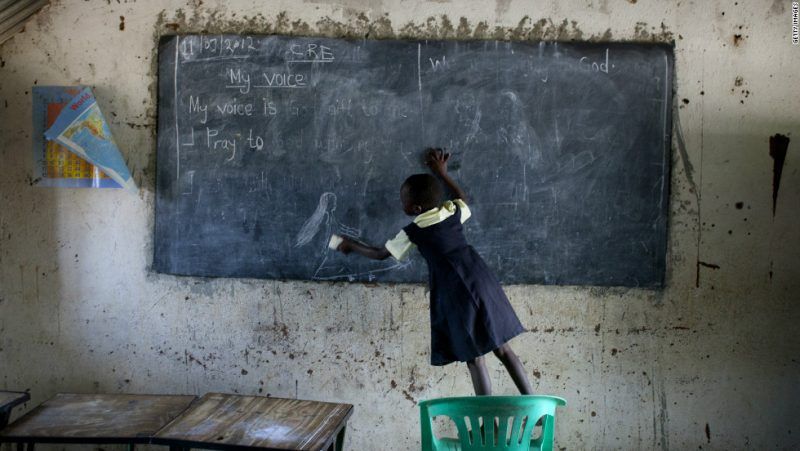
Nearly one hundred years ago, Eglantyne Jebb, the founder of Save the Children, said that the only international language the world understands is the cry of the child.
But our adult world has been unmoved, as 30 million children -- 7 million of them in the last year alone -- have been displaced from their homes in Syria, Iraq, Libya, South Sudan, Burundi and Myanmar in an exodus of biblical proportions.
Not since the end of World War II have so many children of so many different nationalities and in so many different territories been caught up in refugee crises. This week's Oslo Summit on Education for Development, led by Norwegian Prime Minister Erna Solberg, alongside U.N. Secretary-General Ban Ki-moon, gives us the chance to act now to deal with these glaring abuses against children.
This year should have been the year of the rights of the child, as we approach the deadline for the U.N. Millennium Development Goals. Instead, 2015 has become the year of fear, as the rising numbers of girls forced into child marriage, youngsters brutalized as child soldiers in boys' militias, and girls trafficked into domestic service or the global sex trade, now perhaps account for as many as half a million of the already vulnerable children who go missing.
In the past few months, I've visited Jordan, Lebanon and the Democratic Republic of the Congo. Before that I had been to see trouble spots from South Sudan and Nigeria to Afghanistan and Pakistan. I wanted to hear the voices of children, and I did. Recent reports on South Sudan last week tell of what the United Nations has called "a new brutality and intensity"; girls and boys being raped and burned alive, and of hundreds of child soldiers being recruited into the army. Innocence is being vaporized for millions of young lives. And only in the past few days have we learned that several of the 287 abducted schoolgirls from Chibok in Nigeria have been brainwashed into working and killing for their Boko Haram captors.
Ten million of the world's 30 million displaced boys and girls are now refugees from their home country. With the average time away from home in exile at around 17 years, children could go through their entire school-age years, from birth to adulthood, without ever entering a classroom. And rising refugee numbers explain why, according to a new UNESCO report published Monday, 124 million never go to school at all, 59 million of them being primary age boys and girls. While shelter, food and health care are vital to survival, it is education -- and the idea that you can prepare and plan for your future -- that, if curtailed or neglected, deprives young people of hope.
These adolescents will not remain passive forever. I see the beginnings of a civil rights struggle led by young people themselves, adolescents who are using the Internet to link with each other and becoming more assertive of their rights.
The tragedy is that some of the young people may be drawn into terrorism. I have seen how the growth of extremist madrasas has radicalized hitherto studious children. And we need to counteract this, but the challenge to the status quo will also come from young people demanding education, employment and entrepreneurial opportunities. And this will create movements for change far more extensive than the Arab Spring and far more threatening than the Occupy movements of recent years.
Currently, only about 1% of humanitarian budgets go to education. The educational needs of refugees are forgotten, trapped between development aid and humanitarian assistance that understandably focuses on health care, food and shelter, while standard aid budgets are allocated years in advance and take little account of unplanned-for crises.
A new humanitarian fund for education in emergencies could have helped Syria, where half the entire child population -- 6 million -- are displaced and where 2 million face years of exile. In neighboring countries, a double shift systems in existing schools in Lebanon, Jordan, and Turkey can offer learning for less than a dollar per day per pupil.
In Nepal, two earthquakes have left hundreds of schools destroyed, and nearly 1 million children on the streets amid reports that traffickers are selling them for $500 each.
We need to support the rescue services but also the rebuilding and retrofitting of damaged schools.
In addition to the 7.5 million children displaced in sub-Saharan Africa, there are millions of children in fear of going to schools singled out by terrorists as ripe for bombings, burnings and kidnapping. Here we must not only train more teachers and build more schools, but make schools safe and less vulnerable to terrorist incursions. We are pioneering the idea of safe schools, providing community programs, communications, and emergency plans to reassure pupils and parents that everything possible is being done to make schools secure.
Ultimately, 2015 must be a year for global action, on developing a new sustainable development agenda, reaching a politically binding agreement on climate change -- and in the run up to the first ever World Humanitarian Summit in Istanbul in May next year, real and meaningful progress toward protecting and educating the world's children.
Gordon Brown is U.N. special envoy for global education and former British Prime Minister. The opinions expressed in this commentary are solely those of the author.
